#SCLC
Text
They marched for desegregation — then they disappeared for 45 days : NPR

This photo of the group known as the Leesburg Stockade Stolen Girls was taken by Danny Lyons, a former SNCC photographer. It helped confirm the girls' location to their parents and civil rights activists. Danny Lyon/Magnum Photos hide caption
In the early 1960s, civil rights protests were picking up speed across the country. Sometimes, protest marches included children as young as 12 years old.
Usually, children who were arrested at protests were bailed out by activist groups, or eventually released to their parents. But on July 19, 1963, during a march to desegregate a theater in Americus, Ga., a group of Black girls was arrested — and for the rest of the summer, their parents had no idea where they were.
One of those girls was Lulu Westbrook-Griffin.
"We were gung-ho young people who want to change the system," Westbrook-Griffin told Radio Diaries.
Westbrook-Griffin was 12 years old at the time. Her older brother, nineteen-year-old James Westbrook, was a field secretary for the Student Nonviolent Coordinating Committee. With SNCC, Westbrook organized a march to desegregate the Martin Theatre, the only theater in Americus.
At least 40 people attended. But as the marchers approached the theater, local police demanded that they disperse, and began beating them with clubs and setting dogs on them.
"Some of us were taken by our feet and arms and thrown in a paddy wagon, and I was one of them," Westbrook-Griffin recalled.
Westbroook-Griffin's brother escaped arrest. "I told Mom that night: 'They drove her off in a paddy wagon and I have no idea where they went,'" James Westbrook said.
Along with at least 13 other girls, Westbrook-Griffin was transported to a single cell of the Leesburg Stockade — an abandoned, Civil-War-era building more than 20 miles away from Americus.
For the next 45 days, the girls would be subject to squalid living conditions. The stockade lacked running water, plumbing and beds. As the weeks passed, conditions only deteriorated.
"We were putting our waste in the shower drain because the toilet was overflowing," Westbrook-Griffin recalled.
Back in Americus, SNCC activists and parents were focused on locating the missing girls.
"Americus is a small town where everybody knew everybody," James Westbrook said. "It was a network of parents trying to find out, day by day, where their children were."
Throughout July and August, SNCC activists went from jail to jail in search of the missing girls. At one of SNCC's mass meetings, someone mentioned a rumor that the girls were being held in the old Leesburg Stockade.
Danny Lyon was a photographer for SNCC at the time. "James Foreman, who was executive secretary, said to go down and check it out," Lyon told Radio Diaries.
Lyon drove to the Leesburg Stockade after dark. There, he took clandestine pictures of the girls and their living conditions through bars of the building.
Lyon's photos confirmed the girls' location to parents and activists, providing leverage as they fought with authorities for the girls' return. Finally, on Sept. 1 – 45 days after they were taken – the police released the girls to their parents. Danny Lyon's photos appeared in Jet magazine in late September and in a special issue of SNCC's The Student Voice newspaper in 1964.
Westbrook-Griffin and the other girls were never formally charged after the march. They also weren't given a reason for why they were held in the stockade so long.
"Was it to break me? Was it to make me fearful? Was it to teach me a lesson?" Westbrook-Griffin says. She wonders to this day why the girls were kidnapped. "But when you look back at it now, you realize it pretty much was a badge of honor rather than a badge of disgrace. We were part of something that matters."
Lulu Westbook-Griffin and the other girls in the Leesburg Stockade were never formally charged. And local law enforcement never explained why they were held in the stockade for so long.
The stockade is still standing. In 2019, the state of Georgia put a historical marker on the site, acknowledging the incident. It reads, "Because their families were not initially told their location and the girls never faced formal charges, they became known as the Leesburg Stockade Stolen Girls."
#They marched for desegregation — then they disappeared for 45 days#stockade stolen girls of leesburg#leesburg georgia#georgia#white supremacy#right to vote#civil rights movement#kidnapped Black girls#leesburg stockage#sclc#sncc
30 notes
·
View notes
Text
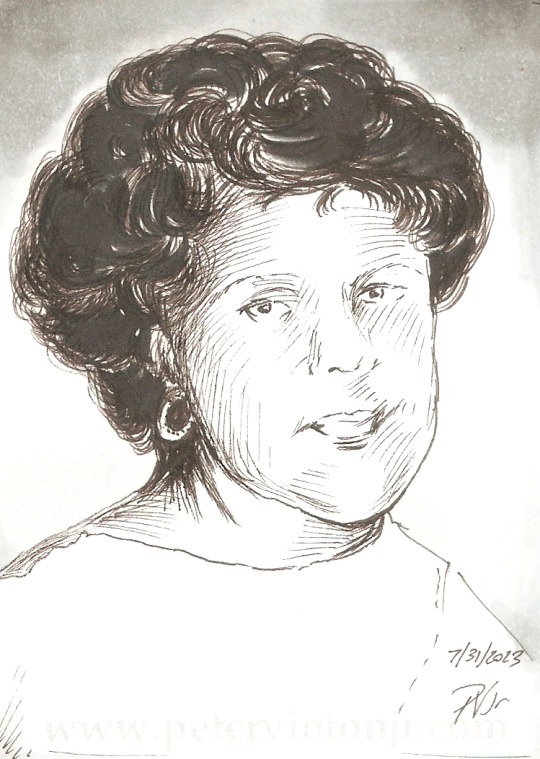
"June sprinkled with uncommon courage."
--Washington, D.C. delegate Eleanor Holmes Norton
Perhaps one of the SNCC's lesser-known (but certainly one of its bravest) heroes, civil rights activist June Elizabeth Johnson was born in 1947 Greenwood, Mississippi, at a time when that region was seeing an alarming rise in white supremacy. Inspired by her church --and over her parents' objections-- Johnson attended her first voter registration workshop at the age of fifteen. By 1962 she had made the acquaintance of Bob Moses (see Lesson #112 in this series), and eventually her commitment to cause of Black voter rights was so infectious that even her reluctant parents ultimately began opening their home to SNCC activists and workers.
On June 9, 1963, Johnson was returning from SCLC Citizenship School training in South Carolina and ran afoul of the driver of a Trailways bus driver over approved seating locations at a rest stop lunch counter. Predictably the driver made a phone call ahead, and when the bus reached Winona, June and her colleagues Annell Ponder (see Lesson #120) and Fannie Lou Hamer (see Lesson #51), among others, were arrested and severely beaten --in particular June was punched in the face and stomach by police, and hit in the back of the head with a studded leather strap until her dress was soaked with blood. Horrifyingly while these assaults were happening, at almost the very same time in nearby Jackson, Medgar Evers was murdered. The attackers were belatedly brought up on Federal charges but were acquitted. Such bleakness might have crushed lesser spirits but June's resolve was only strengthened. Johnson went on to organize the Greenwood Voters' League, and took a job as a paralegal, eventually leveraging that experience into actually suing Greenwood and Leflore Counties for racist hiring practices. She also devoted a great deal of time and commitment to Hamer's and Moses's Mississippi Freedom Democratic Party (MFDP).
Later in life Johnson became vice president of the Office Of Early Childhood Development in Jackson, Miss. and remained a fierce voice for equality, frequently travelling to Washington, D.C. to speak and advocate. Her story was given new attention in 1994 in the publication of John Dittmer's book Local People: the Struggle for Civil Rights in Mississippi. She eventually settled in the D.C. area worked for that city's child support enforcement office, also serving as a consultant for several television documentaries about the civil rights movement. Johnson died in 2007 at the relatively young age of 59.
21 notes
·
View notes
Photo

⚖️#ArtIsAWeapon Honoring and remembering the known and unknown freedom fighters on this 58th anniversary of #BloodySunday. May their courage, wisdom and sacrifices empower us to keep fighting for justice and liberation. #Image: “The Saints of Selma” #Artist: @kellylatimoreicons (repost) Those in the icon from left to right: Front row: Rosa Parks, John Lewis, Martin Luther King Jr., Coretta Scott King, Ralph Abernathy. Middle Row: Amelia Boynton, Hosea Williams, James Forman, Jack Sidney-Snyder, Andrew Young. Back Row: James Orange, Archbishop Iakovos, Annie Lee Cooper, Diane Nash, C.T. Vivian • VIA @eji_org https://calendar.eji.org/racial-injustice/mar/07 On March 7, 1965, state and local police used billy clubs, whips, and tear gas to attack hundreds of civil rights activists beginning a march from #Selma, Alabama, to the state capitol in Montgomery. The activists were protesting the denial of voting rights to African Americans as well as the murder of 26-year-old activist Jimmie Lee Jackson, who had been fatally shot in the stomach by police during a peaceful protest just days before. The march was led by #JohnLewis of the Student Nonviolent Coordinating Committee (#SNCC) and Reverend #HoseaWilliams of the Southern Christian Leadership Conference (#SCLC). The marchers crossed the #EdmundPettusBridge and found themselves facing a line of state and county officers poised to attack. When demonstrators did not promptly obey the officers' order to disband and turn back, troopers brutally attacked them on horseback, wielding weapons and chasing down fleeing men, women, and children. Dozens of civil rights activists were later hospitalized with severe injuries. Horrifying images of the violence were broadcast on national television, shocking many viewers and helping to rouse support for the civil rights cause. Activists organized another march two days later, and Dr. Martin Luther King Jr. urged supporters from throughout the country to come to Selma to join. Many heeded his call, and the events helped spur passage of the #VotingRightsAct of 1965 three months later. #thesaintsofselma #Vote #VotingRights #Blackliberation #WomensHistoryMonth #WhiteSupremacy https://www.instagram.com/p/CpahlB_uQhm/?igshid=NGJjMDIxMWI=
#artisaweapon#bloodysunday#image#artist#selma#johnlewis#sncc#hoseawilliams#sclc#edmundpettusbridge#votingrightsact#thesaintsofselma#vote#votingrights#blackliberation#womenshistorymonth#whitesupremacy
4 notes
·
View notes
Text
Ask Game
Thanks for the tag lovely @emma-blues, @inthedarkkroom, @idyllicephemera and @rovingpixels !
📋rules: answer the questions and tag 9 people you want to get to know better.
🎨favorite color: dramatically depends on the season. Might say brighter and vivid colors in spring/summer, and more muted and earthy ones for autumn/winter
📖currently reading: I’m reading Harry Potter and the Half-Blood Prince for the first time in english, and I’m enjoying it very much. I’m reading the Ravenclaw collector’s edition and the special inserts and illustrations make the experience even more magical!
🎵last song you listened to: don’t really remember which one in particular, but it was from the Organica playlist on Spotify :D
🍿last series you watched: my husband convinced me to watch Babylon 5 with him. I hated the entire first season, but we reached season 3 and I’m in love with it. It has a vintage vibe and a nice exploration of some sci-fi topics I like, unexpected!
😋sweet, spicy, or savory: I def have a sweet tooth eheheh. Breakfast is my fav meal in the day because I get to eat all those fancy and amazingly tasting pastries...*drooling on keyboard*
🧞craving: a bit of good sleep! The moving completely messed up my sleeping schedule and I feel drained
☕tea or coffee: Matcha Cappuccino!
💡working on: re-establishing a sort of queue for Such Colorful Lives Challenge! Let’s say a lot of things happened ingame, I need to find some quite time to make the edits and post them tho.
💌tagging: beautiful people like @bumblingbunny @enchanting-whim @incandescentsims @pixelprincessvlog @estah @tipsy-clouds @maxismade @satureja13
12 notes
·
View notes
Text
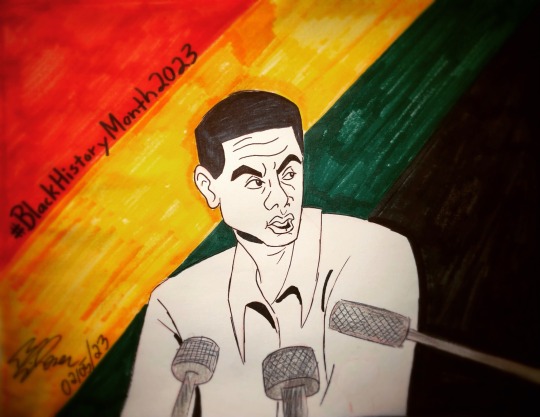
✊🏾“The secret of life is to have no fear; it's the only way to function.” ~Stokley Carmichael/Kwame Ture #blackhistorymonth #blackhistorymonth2023 #stokleycarmichael #kwameture
#Stokley Carmichael#Kwame Ture#civil rights#sncc#black power#black panther party#Martin Luther King Jr#Malcolm X#Black History Month 2023#black power movement#Sunday night#Mississippi Freedom Democratic Party#Freedom Summer#character design#african american history#historical figures#sclc#the 60s#black power militant#John Lewis#black lives matter#blm art#blm#destroy racism#February 2023#black power art
4 notes
·
View notes
Text
March on Washington "60th" We Reflect
1 note
·
View note
Text
Stokely Carmichael and the Origins of "Black Power"
By TJ Love
Black Power. For Black folks, the meaning of the term is self evident. Black Power was here before any other rallying cry and it will always be the most relevant, impactful, unimpeachable, and sturdy ideal for us to strive for when all the catch phrases and hashtags in fade away.
Continue reading Untitled

View On WordPress
#Deacons of Defense#Dr. Martin Luther King Jr.#El-hajj Malik Shabazz#Freedom Riders#Kwame Nkrumah#Kwame Ture#Malcolm X#militant#NAACP#SCLC#Sekou Ture#sncc#Stokely Carmichael#The Black Panther Party
0 notes
Photo
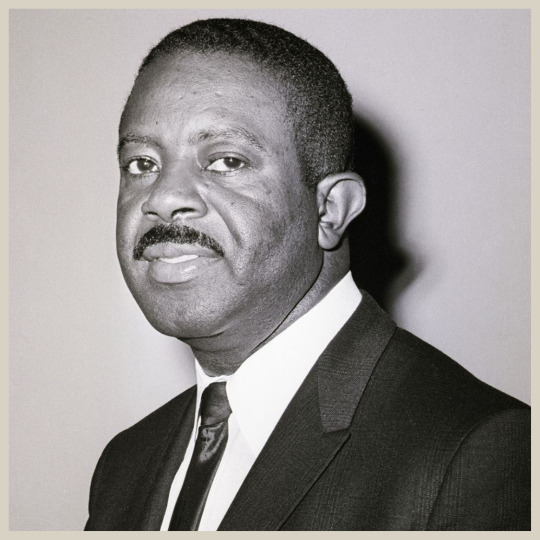
Today we're thinking of Reverend Ralph David Abernathy Sr. on the anniversary of his passing.
Rev. Abernathy was an American civil rights leader and Baptist minister. Alongside his friend and confidant — Martin Luther King, Jr — Abernathy co-founded the Southern Christian Leadership Conference to organize the nonviolent struggle against segregation in the American South.
1 note
·
View note
Text
1 note
·
View note
Text
just took a covid test and jm negative but i am so anxious and insane. i think i have symptoms but i am probably imagining them which only makes me more anxious which only makes me imagine them more. tess pepprs psychological torture moments
#purrs#my dad brought me groceries and david and romy brought me extra tests and mt dad is coming back with toothbrush heads bc i accidentally#touched my toothbrush to the faucet and my roomie and I share a sink and COVID germs last 24h on stainless steel. ihave capstone oresentstio#presentation rehearsal in an hour and sauter is gonna kill me proabblt and i have to tell her im not trying to get out of it it’s that my#roommate went to a party. i have sclc tomorrow and dr shapiro probably thinks im a flake and i am so glad to be done w it LOL and i wanna as#ask her to be a reference for my application but she can’t and i have to be creative with references and this shit is so stressful my heart#is giving out i know im namedropping all these things b nim too anxious to even think clearly and i was so anxious last night I couldn’t sle#sleep. and i have to get my capstone done by Tuesday but im like a deer in headlights rn and shaking so badly. everyone keeps telling me im#gonna be ok and i know feelings aren’t facts and me feeling abject terror doesn’t mean anything but i am so so so so terrified. i just want#to not have a body like i need to ask pat how to separate ur mind from ur body bc being in my body right now is really bad. it’s really bad#ajdni don’t trust myself or anything and it’s so bad. i can’t trust my body or my brain and im at the mercy of the particles in the air. lol#delete later#ik all i post these days is like snapshots of despair abt irl things but this is really really hard. and i just don’t know what else to do
17 notes
·
View notes
Text
youtube
No more lies. I'm done. His name was Michael, and now you know why #Progressives have been insisting for years, that King was a Socialist. I believe them, now.
#Philly BlackLiberation Harlem Christianity MartinLutherKingJr JamesBaldwin CornellUniversity AlSharpton BlackFreemasonry Rot#Rothchilds Rockefeller Zelensky LGBTQ genderequality Rustin DasKapital Marx protestant catholic Methodist Anglican One#Mormonism OneWorldReligion UniversalIncome Reverend Communism SCLC Baptist Politics Trump SocialGospel adamclaytonpowell h#Howard Thurman#Civil Rights#What Would Jesus Do?#Martin Luther King Jr#Youtube
0 notes
Video
youtube
FBI Informant Julia Clarice Brown Was Angry That Dr. King Wanted Reparations
This woman was a lying snake up in the SCLC doin the most to deliver all the news directly to hoover. she was never pointed out even tho the organization knew there was a snitch in the mix. Dr King lost his life due to her and others
#youtube#MLK Jr#Reparations for Black People#systemic racism#snitches#fbi cointelpro#fbi#snitches in the Black church#sclc#FBI Informant Julia Clarice Brown Was Angry That Dr. King Wanted Reparattions
10 notes
·
View notes
Text

"I'm not going to be the teacher. We're going to learn together. You're going to teach me some things, and maybe there are a few things I might be able to teach you, but I don't consider myself a teacher. I just feel that I'm here to learn with you. We'll learn things together."
As an adult educator myself, I couldn't help but be drawn into the fascinating life and philosophies of Bernice Violanthe Robinson. Born February 7, 1914 in Charleston, South Carolina --a day that saw snowfall in Charleston for the first time in more than a century. Robinson's mother, Martha Elizabeth (née Anderson) Robinson took this as a sign that her daughter would spend her life "disturbing the elements." Martha was herself sister to Septima Poinsette Clark's mother (see Lesson #74 in this series), and Bernice's own principles would similarly coalesce around the twin premises of education and citizenship, much like her famous cousin.
In 1929 Bernice moved from South Carolina to Harlem, New York with the intention of becoming a musician, but after a period in the famed garment district, her talents as a seamstress took prominence and she graduated from Poro School of Cosmetology. In 1947 she returned to Johns Island, South Carolina to care for her ageing parents, and with her professional talents was able to open her own salon --a form of economic independence not available to Black women in most other careers. At the time beauticians were traditionally well-regarded amongst civil rights workers, not only because they were known and respected in a community, but also because of their almost-stereotypical role as "the good listeners," and that as self-employed entrepreneurs were less prone to backlash from punitive employers. By all accounts a socially engaging and affable personality with an easy talent for friendly first impressions, Bernice joined the NAACP and made good use of her salon as a "hub" for local activism, and made many contacts and acquaintances.
In 1956 Robinson attended a workshop hosted by the Highlander Folk School (an organization that itself certainly merits its own course of study); her cousin Septima Clark also attended. Ostensibly the topic was about desegregation but over the course of the session the focus turned to civic literacy and educating would-be voters. Bernice expressed an interest in helping to better educate the people of Johns Island but lamented her lack of professional teaching credentials. Clark countered by suggesting that her cousin was the ideal candidate for such a role precisely because she lacked such a credential; that she was perfectly suited to the task because of her lack of formal training --no preconceived notions.
Thusly "voluntold," Bernice threw herself into her new calling; in five months (!) she developed lesson plans, curricula, and distributable materials that would lead to SCLC voter-registration workshops in communities well beyond Johns Island; eventually catching on in Charleston itself. The growth of these first Citizenship Schools in turn fed into the enthusiasm and the missions of CORE, the Freedom Riders, and the SNCC --all of which reinforced one another as they continued to educate and motivate scores of citizens who had never before stepped into a voting booth.
As an adult educator, Bernice also adhered to the principle of never stopping learning: in 1967 she completed a University of Wisconsin correspondence course in community development, and also found time to secure an additional degree in interior design. Robinson stepped down from her behind-the-scenes SCLC role in 1970, having quietly developed what amounted to the most successful and widespread literacy campaign in modern American history. She pivoted to developing curricula for the South Carolina Commission for Farm Workers (SCCFW); and then in 1972 --in what I can only assume is the inherent desire of the adult educator to yet again try something new and different-- she ran for Congress.
#black lives matter#black history month#adult education#lifelong learning#bernice robinson#highlander folk school#teachtruth#dothework#sclc
49 notes
·
View notes
Text
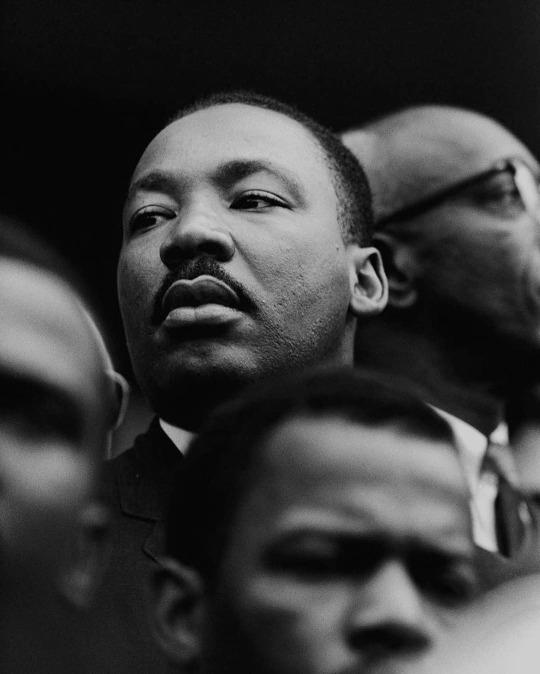
Today In History
Dr. Martin Luther King, Jr., Baptist minister and civil rights activist, was born in Atlanta, GA, on this date January 15, 1929.
Dr. King led the first mass civil rights movement in the United States. He was an iconic figure in the advancement of civil rights in the United States and around the world.
Among his many efforts, King headed the Southern Christian Leadership Conference (SCLC). Through his nonviolent activism and inspirational speeches, he played a pivotal role in ending legal segregation of Black Americans, as well as the creation of the Civil Rights Act of 1964 and the Voting Rights Act of 1965. King won the Nobel Peace Prize in 1964, among several other honors.
King continues to be remembered as one of the most influential and inspirational Black leaders in history.
CARTER™️ Magazine
#martin luther king jr#mlk#carter magazine#carter#historyandhiphop365#wherehistoryandhiphopmeet#history#cartermagazine#today in history#staywoke#blackhistory#blackhistorymonth
151 notes
·
View notes
Text


~ gen 5 - Sulani
#such colorful lives#ts4 challenge#sims 4#ts4 legacy challenge#generation 5#sclc gen 5#Adeline Pessoa#ts4 scenery
32 notes
·
View notes
Text
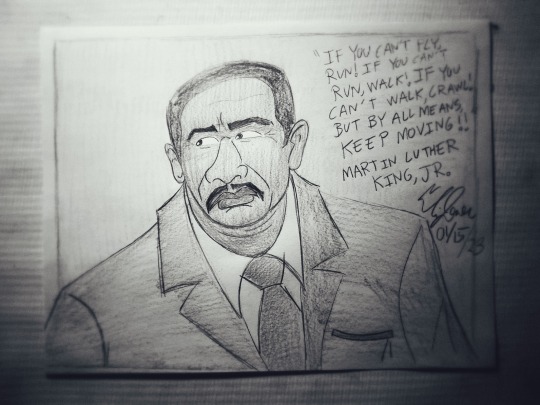
✊🏾🇺🇸 “If you can’t fly, run! If you can’t run, walk! If you can’t walk, crawl! But by all means, keep moving!”~ Martin Luther King, Jr. (1929-1968) #martinlutherkingjr #mlkday #mlkingdayweekend #civilrightsmovement #latenightdrawing #mlk #jfk #rfk #lbj #sclc #sncc #naacp #peacemovement #vietnamwar #the60s
#Martin Luther King Jr#Martin Luther King Jr Day#January 2023#late night drawing#civil rights#JFK#RFK#LBJ#the 60s#sclc#sncc#naacp#Vietnam War#blm art#blm#nonviolence#I Have A Dream#black history#African American history#destroy racism#Freedom Riders#March on Washington#Selma to Montgomery marches#Sunday night#pencil sketch#rough sketch#rough pencil sketch#Montgomery Bus Boycott#March Against Fear
0 notes